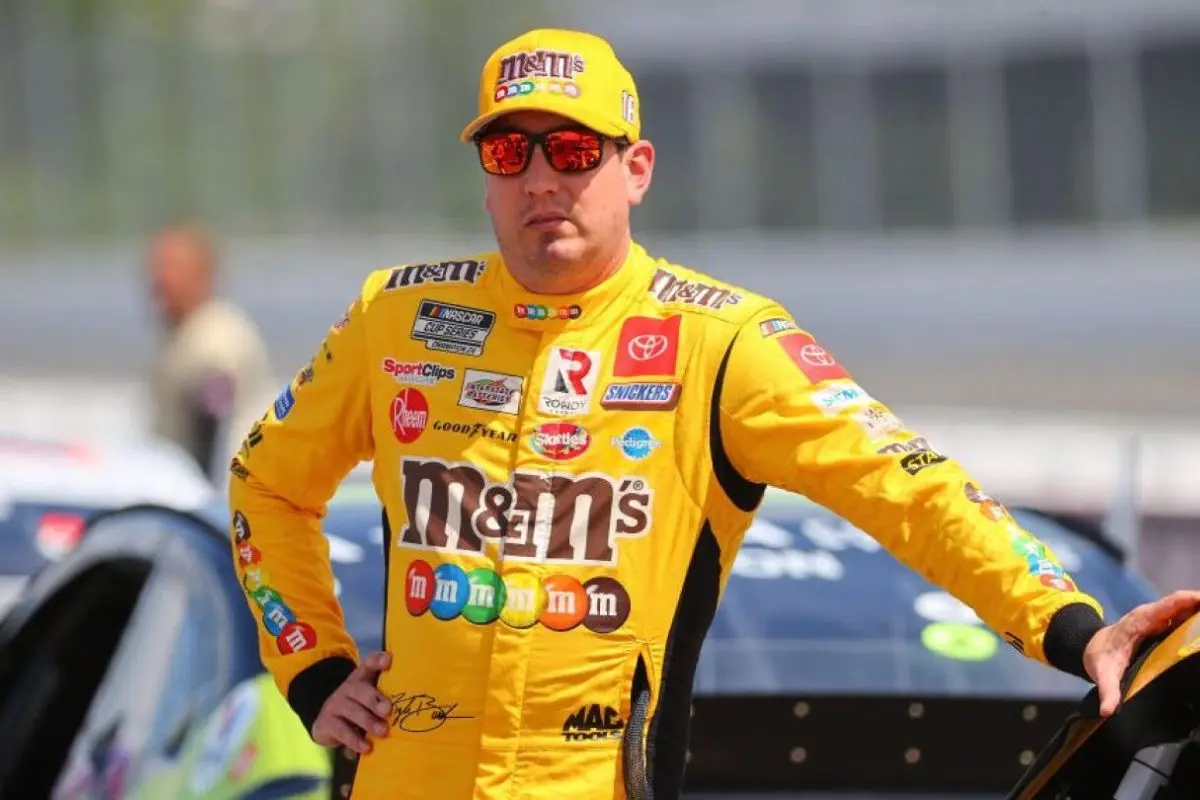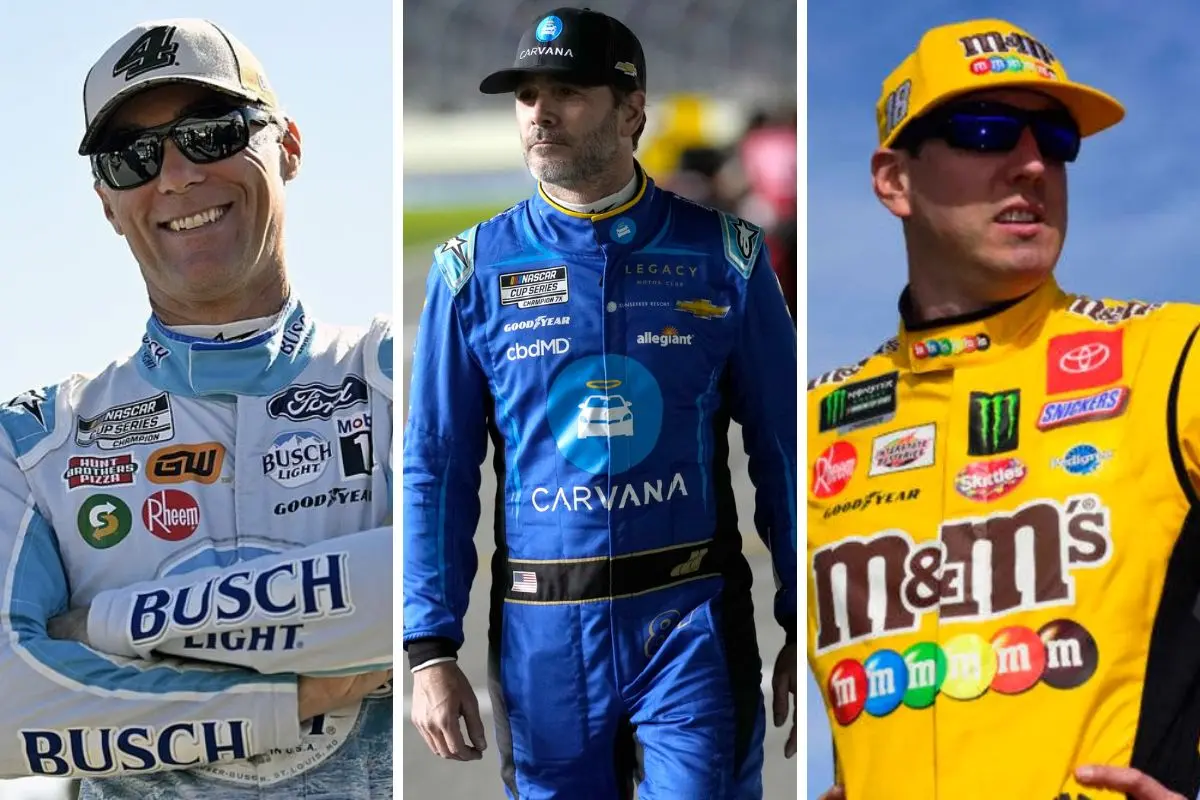Kevin Harvick has raised concerns about the legitimacy of championship titles won by Jimmie Johnson and Kyle Busch, highlighting notable flaws in NASCAR’s playoff format. He argues that the system fails to reward the best car and driver, as a single bad race can drastically affect outcomes. This has led to champaions being crowned under questionable circumstances, such as Johnson’s 2016 title and Busch’s 2015 waiver win. Harvick’s critiques expose the ongoing debates surrounding true merit in NASCAR championships. More insights into this issue are available.
Key Highlights
- Kevin Harvick questions the legitimacy of championships won under the current playoff format, citing inconsistency in crowning champions like Jimmie Johnson and Kyle Busch.
- Harvick argues that a single poor race can derail a dominant season, undermining the merit of championship titles.
- The playoff system’s focus on single-race outcomes raises doubts about what truly defines success in NASCAR.
- Kyle Busch’s 2015 championship win, achieved after missing races, highlights flaws in the waiver system affecting individual driver recognition.
- Harvick critiques titles earned through advantageous circumstances, suggesting they diminish the integrity of championship claims in NASCAR.
Kevin Harvick Stirs the Pot
Kevin Harvick boldly ignited discussions within the NASCAR community by questioning the legitimacy of championship titles won under the current playoff format.
By targeting prominent figures like Jimmie Johnson and Kyle Busch, Harvick emphasized a growing sentiment regarding the inconsistency of crowning champions based on a singular race outcome. This provoked critical analysis among drivers, with many echoing the frustration voiced by Denny Hamlin about the disproportionate weight given to one race compared to the entire season.
Harvick’s critique highlights a growing concern among drivers over the playoff format’s emphasis on a single race for championship titles.
Significantly, Joey Logano’s 2024 championship, achieved with an average finish of 17.1, has further fueled skepticism.
Chris Buescher’s call for a multi-race finale and Mark Martin’s critique of the playoff system highlight a collective yearning for a more equitable approach to determining true season-long excellence.

Harvick Says Playoff System Fails the Best Car and Driver
The ongoing debate surrounding NASCAR’s playoff system has been intensified by Harvick’s recent comments on his podcast. He criticized the current format for failing to reward the best car and driver, stating that a single bad race can derail a season of dominance.
“I don’t think the best car has won. You know since we don’t think the best car has won the championship. I’m just calling it a car okay because in order to have a car you got to have the best driver to win the championship. You got to have the best driver and the best team put together right to win a championship and but I don’t. I don’t know that the best car for a full year has won the championship in this format all the time.” – Harvick
Harvick highlighted key flaws in the playoff system:
- Inconsistent Outcomes: The best car may not win due to unpredictable race circumstances.
- Dominance Undermined: A season of victories can be negated by one poor performance in elimination rounds.
- Championship Legitimacy: The current format raises questions about the true measure of success in NASCAR.
Harvick’s insights emphasize a growing concern that the playoff system may not accurately reflect the best team in the sport.
Kyle Busch’s 2015 Waiver Championship
How does one reconcile a championship win with a notable absence from the season?
Kyle Busch’s 2015 title, achieved after missing 11 races due to injury, exemplifies the contentious nature of NASCAR’s waiver system. Although Busch returned to win four races and ultimately clinched the championship at Homestead, critics, including Kevin Harvick, question the legitimacy of such a victory.
“But I think that like when you go back to 2020 we won nine race. You have the best car. We just didn’t. Didn’t have the best car at the last race. Yeah, you look at Kyle Busch winning the championship. I’m still not sold that. You should be able to miss four, five, six races or whatever it was and be eligible to win a championship. I think you’re hurt and you shouldn’t win the championship. I think if you can’t make all the races you know there’s something to be said about maybe one week but that’s where that owner.” – Harvick
Harvick argues that missing a considerable portion of the season undermines the essence of championship competition, favoring the team’s resilience over the driver’s commitment.
With substitute drivers maintaining competitive performance in Busch’s No. 18 Toyota, the distinction between individual achievement and team strategy blurs, raising concerns about the true meaning of being a champion in NASCAR’s evolving landscape.

Jimmie Johnson’s 2016 “Default” Championship
What constitutes a legitimate championship in NASCAR when victory hinges on the misfortunes of others? Jimmie Johnson’s 2016 title exemplifies this dilemma, as it was marked by a series of unfortunate events for his competitors during the final race. Johnson took advantage of chaos rather than dominating performance, leading only three laps.
The car still wasn’t going to win the championship. Even going back to Jimmie Johnson’s Championship. All the other three guys wrecked he brought this up the other day. The other three guys wrecked in the championship race and he won by default. So it’s a really tough competition.”- Harvick
Key factors include:
- Competitive Incidents: Carl Edwards’ wreck while blocking Joey Logano altered the race’s dynamics.
- Playoff System Flaw: The championship was determined by a single race, overshadowing consistent performance across the season.
- Perception of Default Victory: Kevin Harvick’s critique highlights the questioning of legitimacy when a championship is won through others’ misfortunes rather than pure racing skill.
This raises ongoing debates about the integrity of title claims in contemporary NASCAR.
Busch’s Championship Hunger
Kyle Busch’s championship hunger emphasizes the disparity between playoff success and mere participation in NASCAR’s postseason. For Busch, a successful season surpasses merely qualifying for the playoffs; it mandates progression to the Round of 8 and ideally the Round of 4.
His recent struggles, including a prolonged winless streak and consecutive playoff exits, highlight his high standards. Unlike his teammate Austin Dillon, who revels in playoff entry, Busch’s legacy demands deeper playoff runs.
If you’re Harrison Burton your way into the playoffs and then you’re out the first round, that doesn’t mean shit. For me, a successful season is making the playoffs, and making it into the Round of 8. Making it from the Round of 8 to the Round of 4 theres a lot of situations that can come into play that can get you in there, or out there. A successful season is being in the playoffs, winning races, and being in the final eight.” – Busch
This perspective accentuates Kevin Harvick’s critique of NASCAR’s current playoff format, which can crown drivers based on timely victories rather than consistent performance. Busch’s view demonstrates the tension between traditional championship expectations and a system that sometimes rewards fleeting success, sparking ongoing debate within the NASCAR community.

News In Brief: Kevin Harvick’s Bold Claim Are Johnson & Busch’s Championships Fake
In questioning the legitimacy of Jimmie Johnson and Kyle Busch‘s championships, Kevin Harvick highlights notable flaws within the current playoff system. His critique emphasizes a broader concern that the format may reward inconsistency over performance excellence, as illustrated by Busch’s waiver championship in 2015 and Johnson’s opportunistic 2016 title. Harvick’s remarks invite a reevaluation of championship criteria, emphasizing the need for a system that truly reflects the capabilities of the best drivers and their cars throughout the season.
ALSO READ: Kyle Busch Misses Playoffs: NASCAR Analyst Makes Shocking Admission!
